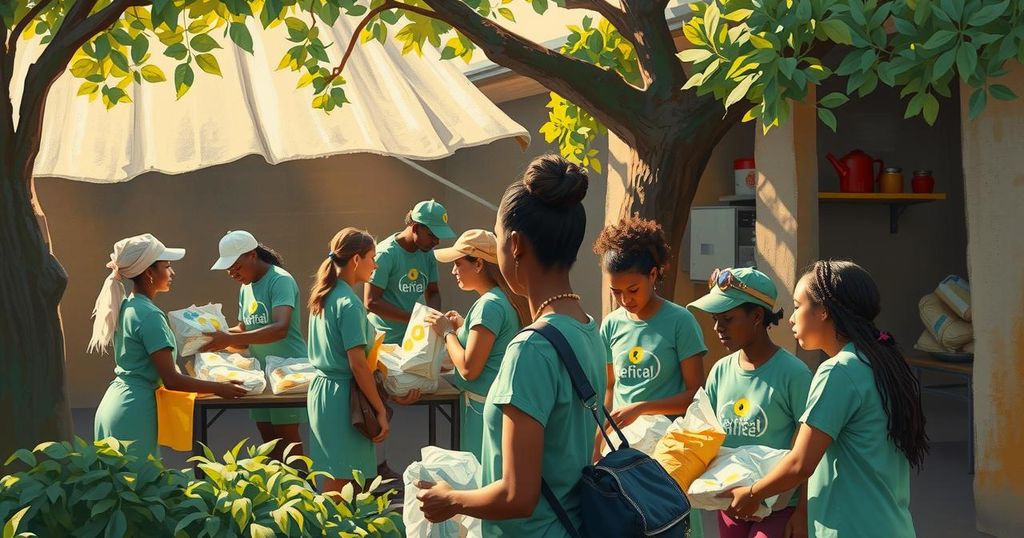In the face of collapse of state structures in Sudan, grassroots activists are stepping in to provide essential services including mental health support, food programs, and community reunification efforts. These initiatives reflect resilience amid chaos, even as they face challenges from military factions and loss of international aid. Sustainable support from global partners is crucial for their long-term effectiveness.
In war-torn Sudan, communities are independently providing essential services as formal state institutions have collapsed. Activists are stepping up to aid families who remain, offering diverse support like mental health services in Emergency Response Rooms (ERRs) and volunteer networks to help reunify displaced families. With the conflict ongoing between the Sudanese Armed Forces and the Rapid Support Forces, humanitarian aid is inconsistent, making grassroots efforts crucial for survival.
The Bahri Emergency Room, founded shortly after the war began, consists of a team providing free mental health services. Coordinator Maab Labib highlighted that their network includes 25 therapists who have supported over 1,500 individuals. Their comprehensive services extend beyond mental health, catering to a wide demographic including gender-based violence survivors and even soldiers, all without constraints of age or nationality.
Despite providing vital support, the caregivers themselves face trauma and displacement. Labib noted, “The service providers themselves are displaced and traumatized,” underscoring the challenges of resource scarcity and ongoing violence. The Bahri team is part of a larger movement of mutual aid initiatives, including communal kitchens and psychological training programs, which stem from Sudan’s past uprisings against authoritarian rule.
These grassroots networks symbolize resilience in the absence of a functioning state. Guido Lanfranchi from the Clingendael Institute explained that they embody hope amidst chaos, illustrating that communities can unite in support, even as militarization intensifies. However, these volunteer groups face intimidation; mutual aid groups have been attacked and constrained by both military factions, revealing a precarious existence.
The humanitarian needs in Sudan are staggering, with nearly 25 million people requiring assistance. The reduction in international aid, especially following the suspension of USAID programs, exacerbates these challenges. Local groups have to fill a widening gap left by NGOs withdrawing their support. For many communities, this shift could mean critical differences in accessing food and trauma support.
Local initiatives like the Safe Haven Organization play a crucial role in providing support. Managing kitchens for displaced families, project manager Mozamul Mohammed Ali shared insights about funding constraints that lead to program cutbacks. The organization has adapted its services over time to include various forms of assistance, even facilitating the emotional reunification of families separated by conflict.
Growing mental health issues among the population are a rising concern. Trauma center manager Mohammed Abkar Goma noted increased rates of trauma-related disorders, particularly among vulnerable groups such as women and children. To address this, Safe Haven trains individuals in trauma support techniques to boost community resilience when professional resources are unavailable.
Despite their relentless efforts, grassroots leaders assert that external support is critical for their sustainability. Ali encapsulated the rising complexity of needs within the community; requesting ongoing international acknowledgment and assistance to fortify their programming remains essential.
The commitment of these activists signifies more than mere survival; it reflects quiet political defiance against the backdrop of institutional collapse. Volunteers continue their work, understanding that, “We just couldn’t watch our people suffer without doing something.” This sentiment underscores the unyielding spirit of solidarity among the Sudanese populace, exemplifying the crucial role of grassroots activism in humanitarian crises.
Grassroots activists in Sudan are bridging the gap left by formal institutions, providing crucial mental health, food, and community support amid an ongoing crisis. Their efforts symbolize resilience and political resistance, even as they face significant challenges from both military actors and diminished international aid. While communities strive to care for displaced individuals, the need for continuous support from global partners remains vital for sustaining these initiatives.
Original Source: www.arabnews.pk






